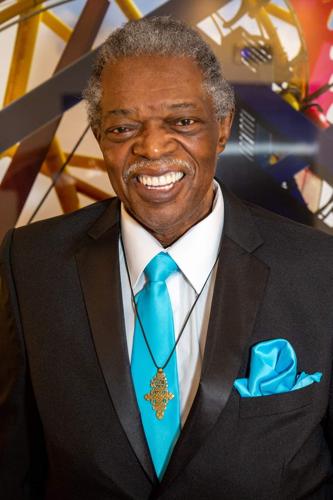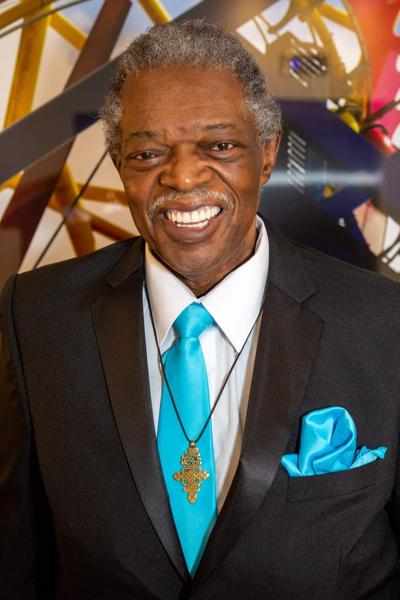Away from Auburn for 50 years, Ted Freeman has moved back home. And he didn’t come back to take it easy in retirement.
A graduate of the former Mount Carmel High School and Villanova University, Freeman’s career took him from work with street gangs, to work as an Urban League executive, a preacher, a minister to the homeless. Years living in Rochester, Jersey City and Orlando, Florida, exposed him to big city dilemmas that he worked to allay. His experiences over the years have strengthened his faith in God and his resolve to turn his skills and understanding toward the city that raised him, the city that his ancestors, Harry and Kate Freeman, helped carve out of the wilderness.
Last September, Freeman visited Auburn to speak about his book “God’s Free-Man," on the early Black history in the city, which is also the Freeman family history, a project he spent much of his life researching. While here, he received a key to the city. The role of Blacks in developing Auburn and the surrounding area has never been fully acknowledged, Freeman maintains.
People are also reading…
Even one-on-one, he speaks with a preacher’s fervor, exhorting his listener, ending his sentences on an up note. Over several hours of interviews, he spoke about the changes in Auburn he has noticed over the half-century he’s been away.
The interview is lightly edited for continuity.
Q: How has Auburn changed since you left?
A: With economic and business ventures, I'm seeing both the Black and white community working together in advancing opportunities for all Auburnians. That wasn't in place 50 years ago. I'm seeing a school district that's interested in improving the opportunities for all our children.
When I came back in September, my first stop was the Booker T. Washington Community Center, (where Freeman served as director for a year 50 years ago). Denise Farrington, who is white, is the director there. It was very interesting to see a white executive director, but I'm noticing how we had kids of every color of the rainbow in the center, and how the staff and her were addressing the needs and the concerns of all those kids.
This is the first place where I've seen the dream of Booker T. Washington being fulfilled in the United States of America, where it doesn’t matter what the color of the director of the facility is. Because that individual will carry out the services to the people no matter what their colors are.
Auburn has been doing it for centuries, and never has given itself credit.
We just got done having a Juneteenth celebration. U.S. News & World Report said we were in the top 12 Juneteenth celebrations in the country. We had a tremendous celebration! Every hue that God made was in every part of the celebration. I'm there meeting the sheriff's wife and we're laughing and having a good time and talking about how we can put programs together to fill the void of what needs to be done. That's the Auburn way.
Then, we go to bed, we wake up, we hear the whole country done blown up, everybody shooting each other at Juneteenth celebrations. We ain't even had a firecracker go off. OK? Auburn needs more mirrors on itself and quit trying to look at itself from others’ perspectives.
Q: What do you mean by mirrors?
A: Auburn has a glow. I was sent out into the world, and I think I reflected the glow of Auburn everywhere I went. I don’t think any community that I touched base with had not been affected by Auburn’s glow. When you’re the source of it, sometimes if you don’t have reflections coming back, you never know how really good you are.
God’s protecting you here. Things are bad? Get a grip. When was the last time a Black person died frozen on a park bench? Melone Village is a country club compared to what I’ve seen and dealt with. Brian (Muldrow) took me to see the housing for the homeless (next to Melone Village). I started crying. You can’t find that nowhere else in this country! You mean they don’t have to sleep in their car? On my street here, it’s like I’m living in a fairy tale — bees and butterflies, people have mailboxes without a lock on it! Get my town some mirrors! Auburn doesn’t have any mirrors.
Q: Fifty years away — what did you learn?
A: Fifty years away taught me that the basic teachings that were instilled in us by our parents are the things that we have to hold onto, to protect more than anything else. We have to learn how to love each other, we have to keep our spiritual principles first. Not religious dictates and pontifications, but basic, spiritual values of love. Not let politics get in the way. Not let color of skin, or sexuality or anything else get in the way.
Q: Coming back, do you see racial progress?
A: I'm seeing people who have advanced in oneness. I'm calling it "the gathering of oneness," and it goes along with my belief that America is a tossed salad (not a melting pot), which allows everybody to be themselves and come together and blend together and create something great.
That greatness is what Auburn has always had. You go back to the very conception of Auburn; this was one of the most important spiritual capitals of the country. Seminary Avenue (where Auburn Theological Seminary was established in 1818) was the joint.
Little is known about New Guinea.
Auburn was never meant to be a megapolis of a million people. It was supposed to be the burning ember, that hot coal that emanates heat throughout the country, that emanates thoughts, that emanates things that people could catch onto and take to other parts of the country. And that's what it used to do. That’s why you had the kind of people coming out of here that folks needed. Lincoln couldn't have done anything without (Secretary of State William) Seward.
Every now and then you need somebody that is a part of the glow, who God has allowed to be a part of other places, come back to say, "Hey, we’re pretty good. We’ve got a lot of work to do, we got some things we got to correct, but we’re pretty good."
If we quit letting folks treat us like we’re some kind of melting pot, and we embrace the concept of being a tossed salad, and we remember we’re the gathering of oneness, we can have the biggest smiles in the country.
Q: What are some issues that need to be resolved?
A: We’ve got some economic issues. I think Miss (Stephanie) DeVito at BID (Auburn’s Downtown Business Improvement District) is working hard to create more economic opportunities for entrepreneurs. I think that our educational system is beginning to take a better look at how we diversify ourselves from the thinking that college is the only way.
The other issue is this: How do we become more creative? How do we become a research and development-thinking community once again, where we can create our own ways of generating income, so we don’t have to become dependent upon some other business coming and leaving? People want to come here because we're hard-working people who care, who love our community, who love our way of life, and who don't like the craziness that seems to surround us.













